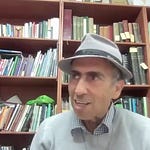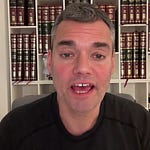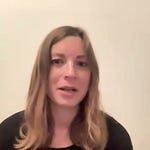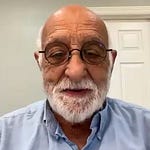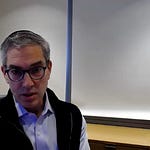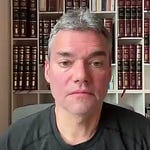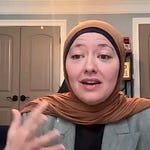For the next few weeks, most of my book events for Being Jewish After the Destruction of Gaza are outside the US. You’ll find a list of book-related events below.
I’m happy people are reading my book. But I know that many talented Palestinian authors don’t get the same attention. So, I hope people who buy my book also buy one by a Palestinian author. For instance, Daybreak in Gaza: Stories of Palestine Lives and Culture, edited by Mahmoud Muna and Matthew Teller with Juliette Touma and Jayyab Abusafia.
I hope readers also donate to people in Gaza. For instance, Hossam and Mariam Alzweidi, who were severely injured along with their four children by Israeli bombs and have been displaced ten times since October 7th. They’re trying to raise the money to seek medical care in Egypt. Their GoFundMe page is here.
Here is a message from Hossam, sent by his sister Abir, last Wednesday:
Yesterday, I received an invitation from the Palestinian Authority for Development for my children to attend recreational activities and psychological support sessions. My 9-year-old daughter, Malak, and her neighborhood friends were overjoyed—finally, a chance to play and feel like children again after days in shelters.
Tragically, at 11:30 AM, the site was bombed by an F-16. The blast shook our neighborhood. Malak and the other children ran in terror to escape the shrapnel. In the chaos, Malak fell, injuring her arm. She now suffers from a deep bruise and severe joint pain.
Hospitals are overwhelmed, and care is delayed as medical staff attend to the most critical cases. We wait with patience and faith, hoping Malak’s condition will improve soon.
Please keep Malak—and all the wounded children—in your prayers. Your continued support means everything to my family. Even in fear, we hold on to hope. Together, we will survive this war and one day heal and rebuild.
Friday Zoom Call
This Friday’s Zoom call, for paid subscribers, will be at a special time: 12:30 PM Eastern. Our guest will be Khaled Abou El Fadl, a professor of law at UCLA and one of America’s preeminent Islamic scholars. He’s also a passionate critic of authoritarianism in the Muslim world who has paid a significant price for challenging tyrannical regimes. I recently had the privilege of appearing alongside him in a discussion about Jewish and Muslim obligations in the wake of Israel’s destruction of Gaza. I felt I was in the presence of a profound religious voice.
After this Friday, we will take a break. There will be no newsletter on Monday, May 19 and no Zoom call on Friday, May 23, as I’ll be travelling in Australia. We will resume on Monday, May 26 and Friday, May 30.
Book Tour
(We’ll update this every week.)
On Monday, May 12, I’ll be speaking at Parkdale Hall in Toronto.
On Tuesday, May 13, I’ll be speaking at the Woodstock Jewish Congregation.
On Sunday, May 25, I’ll be speaking with Debbie Whitmont at the Sydney Writers Festival in Sydney, Australia.
On Tuesday, May 27, I’ll be speaking at the Wheeler Center in Melbourne, Australia.
Things to Read
(Maybe this should be obvious, but I link to articles and videos I find provocative and significant, not necessarily ones I entirely agree with.)
In Jewish Currents (subscribe!), the Palestinian legal theorist Raef Zreik writes about the legacy of German-Jewish religious thinker, Martin Buber.
I spoke about Being Jewish After the Destruction of Gaza at Harvard Divinity School and via Zoom with Barnett Rubin at the Willoughby Wallace Memorial Library.
Eric Alterman on the “Coming Jewish Civil War over Donald Trump.”
A former West Bank settler on why he refused to serve in the IDF.
See you on Friday,
Peter
So, the kind of American part of my book tour is pretty much over. I’m actually recording this from Canada, and then I’m going to Australia and the UK and Ireland. And I don’t have many more book events in the United States. I’ve been traveling around the US for like more than three months now. And one of the really interesting things about doing that is I get a kind of a sense of the conversation about Israel-Palestine at maybe at a more grassroots level than I would otherwise. And it’s especially interesting because I can compare what I see now to what I saw when I wrote this book called The Crisis of Zionism 13 years ago, back in 2012, just to see how things look different when I go out and speak to lots of different folks than they I did back then.
Reflecting on it, two things really struck me. Two differences have really struck me. The first is a kind of collapse of what you could call the kind of liberal pro-Israel position. In 2012, when my book came out—and that was a less radical book. I mean, I still supported two-state solution of a Jewish state next to a Palestinian state back then. But the book was still pretty harshly attacked by a bunch of people—journalists, commentators—who were kind of liberals in good standing, you know, and they thought I was being too harshly critical of Israel. And, you know, those were the most important criticisms of the book. And they were tough for me because these were people who were arguing from within a kind of similar ideological or kind of moral position that I was, you know, about liberal democracy, about equality. But they were still very, quite staunch defenders of Israel.
And I think that today what I notice, what the book kind of response to the book has really made clear to me, is that those voices are much, much weaker than they are now. It’s partly generational, I think, because that position was stronger amongst older people, and more than a decade has passed now. I think it’s partly because the whole center of gravity in kind of liberal/progressive kind of circles has moved left. I mean, you know, 13 years ago is also a time where you would have found more people who are considered liberals in good standing in the sense that like they were influential commentators, you know, who had the ear of prominent people in the Democratic Party who would have been more hawkish in foreign policy, right, who were still defending the intervention in Afghanistan, if not Iraq and supporting military intervention in Syria or Libya. That position also, I think, is largely gone by the wayside.
There was also, I think, more legitimacy to a kind of more neoliberal economic policy in the Democratic Party. So, these activist movements, starting with Occupy in 2011 and Black Lives Matter and Me Too and others, I think, have pushed the center of gravity in general in kind of mainstream progressive and liberal debate. And so, I think you see that on Israel and Palestine as well. There are, of course, still a lot of politicians who kind of are in good standing in the Democratic Party, and are very pro-Israel—you know, Ritchie Torres or John Fetterman and all these people—but if you look at kind of in public commentary among journalists, writers, people in the public culture, I think you find that position is much, much weaker and much less prominent. Some people who used to defend Israel who are liberals, I noticed, just really don’t write much about the subject, or some of them write about antisemitism as a left-wing problem, but you notice they don’t really write actually much defending what Israel is actually doing.
And so, what I’ve noticed is that it’s meant that there’s been a lot of really harsh criticism of my book, but most of it is really now coming from people who are kind of firmly anchored on the ideological right. They’re not people who speak within a kind of liberal, let alone progressive, idiom. And so, even though I don’t, you know, the criticisms are still very harsh, I don’t feel like they’re coming from people who are speaking within the same kind of ideological perspective that I am. It feels just much, much more polarized. And I think that you see this in the Jewish community in particular, in which the energy in pro-Israel circles in the United States is not among self-described liberals. It’s among people who actually are anti-liberal and are very comfortable with the Trumpian Republican Party in general.
One consequence for me of this has been that it’s actually I’m less likely to speak in ideologically mixed spaces. Or in some ways like that there’s kind of less of a centrist group of people for me to speak to because there’s such great polarization now that in more right-leaning spaces, I’m not going to be invited to speak. And so, I don’t have the experience, which I used to have more of speaking to groups of people where people really had more significant disagreements with me. And I really miss that. In some ways, the saddest thing for me about this whole experience is that while it’s nice to speak to people you agree with, I find that I’m less and less likely to be invited to speak to the kind of audiences where people would disagree with me. But I think that’s partly because my position has become more radical, but also because I think of this broader polarization in general within the Jewish community and in America more generally.
The second thing that I’ve noticed is that I feel like 13 years ago, the Palestinian solidarity world, and the kind of Jewish kind of anti-occupation world, the kind of world of J Street, you know, wanting and opposing settlements, that kind of thing, were very, very distinct. And I felt like, you know, when I used to speak to kind of liberal groups, Jewish groups, there were very few Palestinians around very frequently. And I think that over the last 13 years, what I feel like is that those two worlds have kind of come to coincide more. Which is to say, I feel like there’s a more integrated Jewish and Palestinian and other kind of community of people than there was back then, or at least that I had access to back then. And I think it’s partly because all of these years of the Netanyahu government and Israel’s destruction of the two-state solution and Israel moving further and further right has led people who were genuinely opposed to occupation and to the settlements, I think to become many of them more open—especially younger people—to become more open to the deeper, more fundamental criticisms of the idea of a Jewish state and of political Zionism.
And I think, as that’s happened, what I’ve noticed is that in this book tour, I’m much more likely to meet Jews and Palestinians and other folks who, across these different lines of ethnicity and religion and community or whatever, have built really strong ties to one another. I feel like over the last decade, the activist work that’s been done has built stronger bonds of trust between genuinely progressive Jews and Palestinians and Arab Americans and Muslim Americans and other folks than existed before. And I mean, if you saw that in the encampments with young people where you had these genuinely very, very diverse groups of people who were coming together to protest. And it’s really quite impressive and powerful to see the level of connection and trust and affection and admiration that I’ve seen again and again in Michigan, in California, in Philadelphia, in Wisconsin, between Jews and Palestinians, especially given that we are in a moment where, on the ground, the destruction of Palestinian life has been so brutal and this kind of radicalization is so great.
And it really does give me a sense of hope. I mean, the events that I do these days for the book are also much, much better attended than they were in 2012. I’d like to think that it’s because I’m a much better book writer, but I think it really has to do with a greater centrality of this issue, and a way in which many people have come to see this issue as central to what it means to be progressive. And when I look out at these crowds, these very diverse crowds, I feel like it seems to me like it’s so obvious these people are the descendants of the people who are in the anti-apartheid movement and the anti-Vietnam War movement, and even beyond that, the people who were in the movements for abolition of slavery and for women’s suffrage in the United States. That this movement has echoes of those things. And that it, at its best, it embodies in some ways, it manifests, the principles that it would like to see in Israel-Palestine, which is principles of genuine equality under the law, respect for the dignity of all people, and a political community, a kind of—what King called like a beloved community—of people who, regardless of their different backgrounds and ancestries, actually share a common vision of the way human beings should be treated.
And I’m really struck by the degree of passion and energy, even despite the terrible repression of this moment, the horror in Gaza, which gets worse and worse and worse, the fact that there are crises on so many different fronts. It’s just so obvious to me that this movement, which was building before October 7th and has grown over the last year and a half a lot in opposition to the destruction of Gaza, that the movement is really not dead. That it is very, very powerful, even though its power may be often obscured for people in Washington and some in the media. And that’s part of the reason I think that Biden and Harris made these disastrous political decisions. They didn’t understand how many people across different racial and ethnic and religious groups really cared about this subject.
And my experience going is to see not only those people care, but that they’re willing to work very, very hard to try to change US policy. And that if there were a politician with the courage and the political skill—let’s say in the 2028 presidential campaign—to put this issue front and center, to speak in the way that Zohran Mamdani is speaking in the mayoral race and connect this position—I should say Brad Lander, there are others who also have a progressive record on this in the New York mayoral race, which is great that there’s more than one. Ideally, we’d have more than one in a presidential race: people who are willing to unapologetically connect this to a larger progressive agenda about equality, and about human decency, and liberal democracy. That this movement that is there would really ignite and be a very powerful force in American politics and really have the possibility of changing the Democratic Party and changing American policy towards Israel.
And so that’s really what has been a tremendous source of hope for me, even in these incredibly awful and dark days. I just see how much talent and passion and energy there is across the United States. And I really do believe that one day that power of that movement will be made manifest for people as a whole across America.

